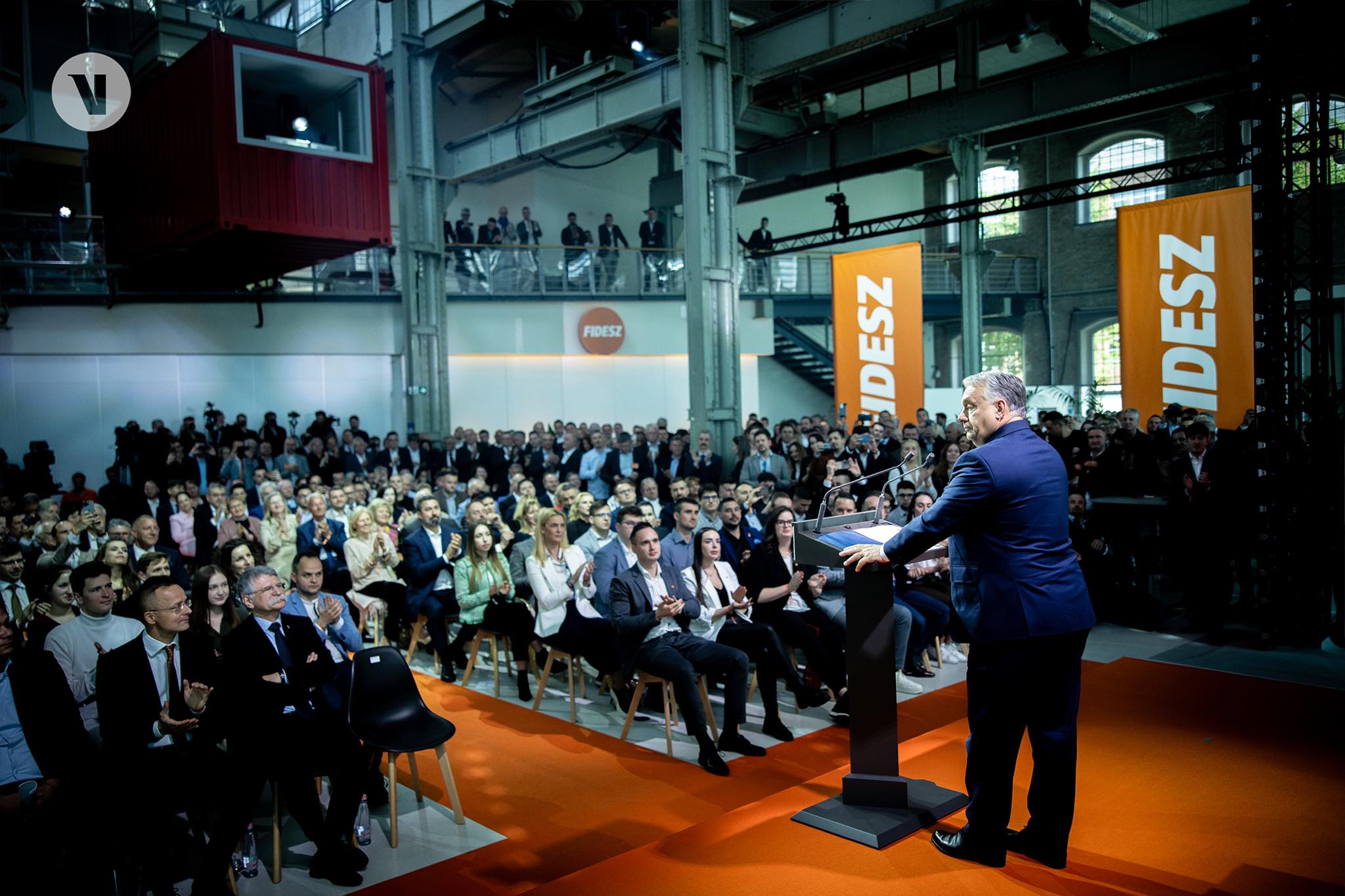
PM Orbán at the Fidesz EU campaign launch event.
Photo: Viktor Orbán on Facebook, 19 April 2024
Hungary’s ruling party, Fidesz, officially launched its European Parliamentary election campaign last weekend, positioning itself as the leader of an emerging pro-peace block in Europe, whose main goal is to prevent the country and the EU from being dragged into a conflict with Russia by the Brussels elite.
The national conservative Fidesz has been heavily criticizing what it calls Brussels’ “failed” Ukraine policy: sanctions that have failed to dent Russia’s economy but heavily impacted Europe, as well as endless financial and military aid given to Ukraine that doesn’t seem to make much difference on the battlefield.
On top of the questionable strategic decisions that only seem to draw out the war and stack up the casualties, the Hungarian government believes that the policies and rhetoric coming out of Brussels might also slowly escalate the conflict, dragging the whole of Europe into war with Russia. Avoiding such an outcome is the biggest priority of Fidesz among everything that’s at stake at the coming EU elections, PM Viktor Orbán said in his speech at the party’s campaign launch event.
“In Brussels today there is a pro-war majority. The mood in Europe is that of war, and politics is dominated by the logic of war,” Orbán said, pointing out that European leaders are acting like the war in Ukraine was theirs to fight, and are making preparations accordingly that might easily escalate the conflict.
Orbán went on:
We are one step away from the West sending troops to Ukraine. This is a vortex of war that could drag Europe down into the depths. Brussels is playing with fire. … [W]orld wars are never called “world wars” in the beginning. They are called “the Third Balkan War,” “the Molotov-Ribbentrop Pact,” “the partition of Poland”; and then they ended up as two world wars. It is no exaggeration to say that what they are doing is tempting God.
The #Brussels bureaucrats are pro-war. We need a pro-peace majority in Europe. This is the stake of the election. #NoWar pic.twitter.com/2Fi5r4kiu6
— Orbán Viktor (@PM_ViktorOrban) April 21, 2024
Instead, Fidesz has been consistently calling for Europe to pursue a pro-peace strategy, forcing both sides to the negotiation table as only a quick ceasefire can prevent further unnecessary deaths and suffering, and then let diplomacy take over.
Fidesz is not alone in Europe with its pro-peace stance, although the position is only shared by one other EU government: Robert Fico’s Slovakia. Many of the right-wing populist and national conservative parties that are set to come in first or second in the EU elections—including France, Germany, Austria, the Netherlands, and Belgium—share Orbán’s vision for a paradigm change in Europe’s Ukraine strategy, demonstrating that the message resonates with a considerable portion of Europeans.
In fact, according to research published by the European Council on Foreign Relations (ECFR), only one in ten Europeans believe Ukraine will win, and a clear plurality (41%) would like Brussels to push Ukraine towards negotiating a peace deal as opposed to only 31% who think the EU should continue its support indefinitely.
This pro-peace position, however popular among voters, hasn’t stopped the European Commission from describing its proponents as Russian “proxies,” akin to Hillary Clinton’s infamous “deplorables” gaffe.
This apparent inability to accurately represent voters’ wishes—not only with regards to the war, but with many other issues such as migration, climate, or economy—leaves no other choice but to replace the current EU elite, Orbán said. “We have to occupy Brussels, push aside the Brussels bureaucrats, and take matters into our own hands,” the prime minister said. “If we do not, then the incompetence and debility of the Brussels leaders will exact a heavy price” on Europe.
Fidesz’s election program is simple. Protect the security of the country and avoid being dragged into war. Protect economic achievements from the disastrous consequences of EU politics such as migration and the green transition. And protect families and children from harmful progressive ideologies. “To make it clear to Brussels: no migration, no gender, no war!” Orbán concluded.
The Fidesz-KDNP coalition is expected to win 11 (out of 21) Hungarian seats in June. Five opposition parties are also expected to send MEPs to Brussels, but only between 1 and 3 each.
National conservative, sovereignist and Christian forces are on the rise all across Europe.
— Orbán Viktor (@PM_ViktorOrban) March 21, 2024
We don’t represent #progressive ideas, we represent the people.
We are the worst nightmare of the #Brussels bureaucrats.
We will win the #EuropeanElections this June and we will… pic.twitter.com/ixYRMKQiHN
